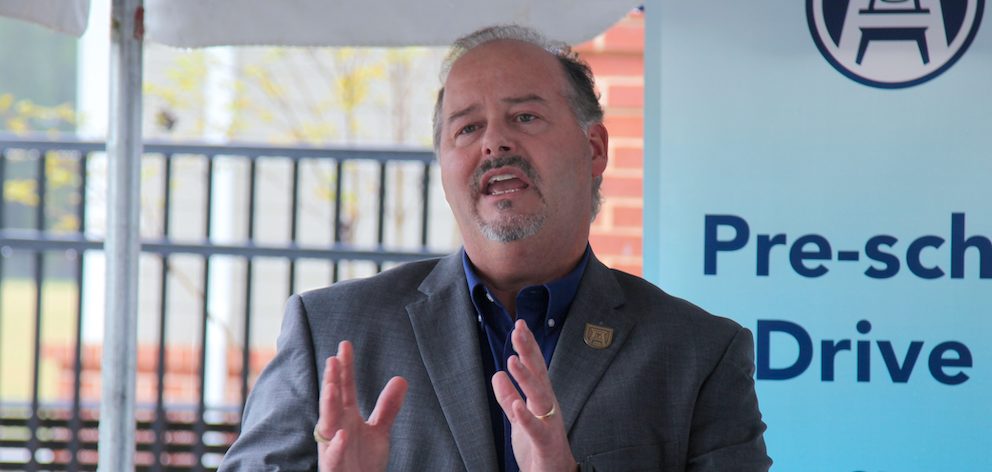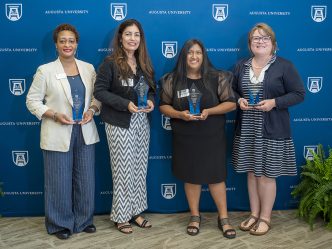Over the past two-plus years, Dr. Phillip Coule has become synonymous with Augusta’s battle against the COVID-19 pandemic. As Augusta University Health’s vice president and chief medical officer, he’s become one of the more recognizable faces in the community’s fight to stay healthy.
This weekend, Coule and 23 others will be honored during Augusta University’s Alumni Weekend festivities. Given Coule’s service, The College of Science and Mathematics is honoring him with their distinguished alumnus award for 2021.
“I try to live by the motto I’ve never asked somebody else to do a job that I’m not willing to do myself,” said Coule, who also teaches in the Department of Emergency Medicine at the Medical College of Georgia.
It’s a motto that’s gotten him to this point in his career and it’s also how he’s gained the respect of a lot of colleagues and community members over the years. He’s a lifelong Augustan, having grown up here and attended what was then Augusta College, graduating with a Bachelor of Science in Biology.
Those hours in the classroom have proven to be an invaluable tool, especially when it came to dealing with the pandemic.
“It was challenging enough that I really had to rely on every facet of my education, training and experience to help manage the crisis,” said Coule. “When I look back to even trying to understand the reports coming out of the Georgia Department of Public Health regarding the case rates and the confounders of statistics, I even had to harken back to my statistic classes when I was an undergraduate as well as my biology classes. It really was every piece of training and experience to pull that together.”
Listen: Dr. Phillip Coule on In the Wild, Augusta University’s official podcast
Despite his newfound fame in the community, some may not know Coule’s upbringing and how he got into medicine. His dad was a medical photographer at Eisenhower Medical Center at Fort Gordon. He would photograph unique cases, child abuse survivors and even autopsies. One day, when Coule was 13 years old, the two of them were fishing when his dad was paged to cover an autopsy.
“His intent was to just park me in an office somewhere while they did this autopsy. Instead what ended up happening was I got to go see the autopsy. While they were doing the autopsy, the pathologist was giving me a free anatomy lesson. Nothing about it grossed me out and I was so awestruck with the miracle of the human body.”
A few years later, the Coules happened upon a bad wreck on I-20. McDuffie County EMS came to the scene and Coule said while everyone was running around in a panic, the crew was cool as could be, which left him awestruck. It also led to his lifelong career in medicine.
While a senior in high school, he went to Aiken Technical College to get his South Carolina EMT license and then went to Augusta Technical College to get the courses for his Georgia licensure. He would work his way through college both on the ambulance and as a 911 dispatcher.
Initially, he went to Mercer University in Macon, Georgia, on a scholarship. When the tuition went up and his scholarship didn’t, he chose to come back home and enrolled at Augusta College. He knew of the school’s great reputation for education at an affordable price.
“Even then it had the reputation of very well-trained, well-educated individuals who had an acceptance rate into medical school that was quite respectable for a college of its size and stature,” he said.
The Medical College of Georgia became his first choice and he got accepted. All the while, he continued working as an EMT and on the ambulance. Since he regularly brought patients to the hospital as an EMT, he was plenty familiar with the workings in the emergency department and trauma center.
“After seeing what the guys in those two areas did, it was hard for me to do anything else.”
Coule was still working some while in medical school, and it didn’t take long before he added another role. When he got into the residency program in emergency medicine, he discovered there was a suboptimal relationship between the emergency department and EMS. He went to then chairman Dr. Larry Mellick to work out a solution.
“I told him there was really an opportunity to change this relationship: We need to be working collaboratively with EMS and we need to help train them and we need to have better interaction between that pre-hospital emergency care and the care in the emergency department. He said, ‘OK, you’re now the EMS coordinator,’ and this was still while I was a resident,” Coule said.
After joining the faculty at the Medical College of Georgia, he would continue in that role as EMS coordinator — all while continuing to treat patients as a practicing physician. Having worked in the emergency department, he developed a deep understanding and appreciation for all the roles within the health system since he did most of them himself. It got to a point where he might as well continue to aim high, he said, and since then he has climbed the ladder to where he is today.
That deep understanding of each role in a health system has allowed him to keep living by his motto.
“When someone goes to describe something, I always relate back to what I did when I was in a similar role and what it felt like and what the pressures were and what systems worked and what didn’t,” he said.
He’s been able to put this motto to practice on more than one occasion.
“I was in the emergency department one day waiting on a trauma patient to come in and I saw a spot on the floor that wasn’t cleaned because we had rapidly changed the room over. So I went to get something and was cleaning the floor and somebody was like ‘Why is the chief medical officer cleaning the floor?’ I said because it needs to be done. That’s always just been my approach. I’ve done that job where I was responsible for cleaning the floor and am still responsible for cleaning the floor.”
 Augusta University
Augusta University




